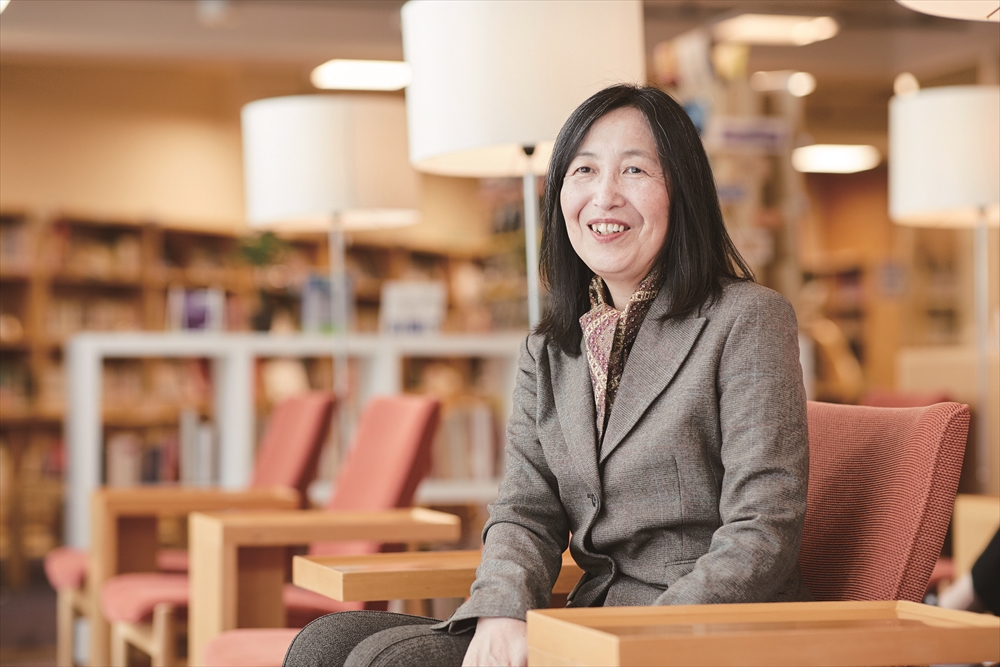AIU TOPICS
AIU Voices
【Faculty Voices】 Episode 8: “My struggles in youth” – Dr. Yuko ABE
You may have seen the faces of our faculty members, be it in a face-to-face classroom, an online classroom discussion, the university brochure, or possibly, through their professional outputs. But do you know how they really are as an individual?
This Faculty Voices series aims to acquaint you with some of our unique faculty members in the form of a relay essay by the faculty themselves. You will have a chance to get a glimpse of the faculties’ personal agenda, concept on life, philosophy, and memories, as well as their area of profession and research theme.
The eighth episode of the Faculty Voice series is from Dr. Yuko ABE.
Dr. Abe was born in Tokyo and graduated with a Master’s degree in Education from the University of Sheffield in the
United Kingdom in 1997, and has been teaching at AIU since its establishment in 2004. After starting work at AIU,
she obtained her Doctoral degree in Multicultural Education from Ochanomizu University in 2016 and thereafter
assumed the role of Head of AIU’s Japanese Language Program since 2017. Dr. Abe has a wealth of experience in
Japanese language teaching.

My Struggles in Youth
“If I don’t go now, I may never have the chance.” — I resigned the company where I had worked for three and a half
years after graduation from university and flew to England without any definite aim.From the strong influence of a three-week home stay in the US during my university years, I’d always wanted to
experience another long-term international experience. I wanted to see with my own eyes the topic of my study from a
psychology seminar in university, “the different approaches to educational perspectives and parent-child
relationship between Japan and Western countries.” I couldn’t find meaning in the company where I was employed and I
tried to search for the purpose of my life through various activities. I also had a boyfriend at the time and was
afraid that I wouldn’t be able to go abroad for long periods after getting married. All these prompted my decision.J and me at the backyard of my host family’s
house.I went to England and found a host family with whom I got along well with through the language school I was attending
at the time. The husband of the family worked in the Royal Air Force and returned home only once every few weeks. His wife,
“J,” who was a little older than I was, was busy looking after four children, a St. Bernard, and her parents who
lived nearby. I went to primary and secondary school with the children every day and had my own class schedule to
attend in a secondary school with courses such as drama, religion, and foreign language, where I regularly
introduced Japanese language. In primary school, I assisted in reading, writing, and arithmetic. I was impressed by
the flexibility and generosity of the English schools that let a foreigner who cannot speak English properly do
this. At home, J and I discussed about education and compared the cultural differences between the UK and Japan
almost every night. I realized how little I knew about my own country, and I thought about the differences in the
values of the two countries. J was very good at guessing what I wanted to say in my poor English. She was rich in
emotions and very expressive.Thanks to her great influence and wonderful personality, I became deeply immersed in the life of this family. During
my stay, many significant family events like illness and death had happened, and every time I was upset and annoyed
at my uselessness. I was deeply involved in their life. Since there were no e-mails or social networking services at
that time, the only communication tools available to me were writing letters and making short and rare telephone
calls. I hardly interacted with Japanese people during my one-year abroad, which had ended due to the expiration of
my UK visa and lack of money.My
birthday party thrown by the host family.Returning to Japan, a “reverse” culture shock was waiting for me. My parents and friends told me that I’d turned to
using harsh words and that my personality had become much stronger and assertive. My boyfriend and I also broke up.
Japan was not a comfortable place to live in for me anymore. I felt confused and uneasy with the Japanese
conversation style, marked by reserved and conformed attitudes. It seemed to me that it is not my country anymore
and I felt like a rootless wanderer. I decided to pursue the cause of my uncomfortable feeling by becoming a
Japanese language teacher for foreigners and to learn with them about intercultural communication.After going back and forth between England and Japan since then, I was gradually able to accept Japan as my own
culture through gaining a greater understanding of the diverse aspects of both cultures. Getting a job at Minnesota
State University Akita School, an American university that was formerly established on the current AIU campus, had
helped me a lot. It was an ideal environment for me to work in, surrounded by colleagues with foreign backgrounds in
a region where many people are still deeply influenced by traditional Japanese values. I finally found my
comfortable place at the intersection of Akita’s traditional style of rural life with the pioneering style of
international higher education.Times have changed and now studying abroad has become much more popular and easier. AIU has a lot of students with
diverse cultural backgrounds. Each person has their own experience and some students may even be struggling with
their cultural identity much more than what I had experienced. It may be difficult, but it is a very valuable
experience. After all, I believe I made the right decision.
Click here to learn more about AIU faculty.
Click here for more episodes from the Faculty Voices Series.


